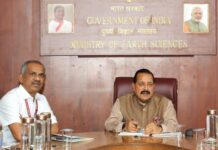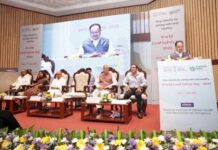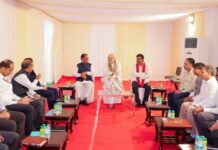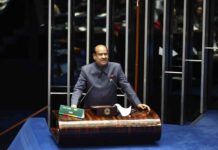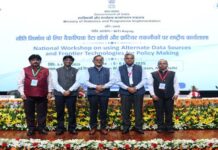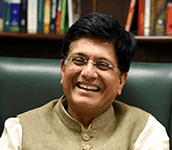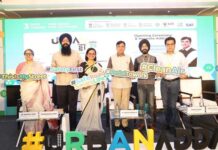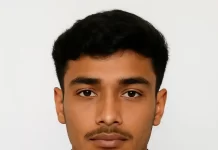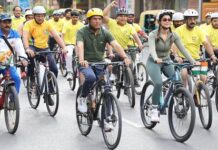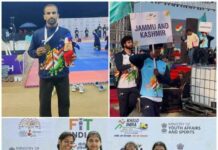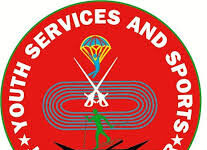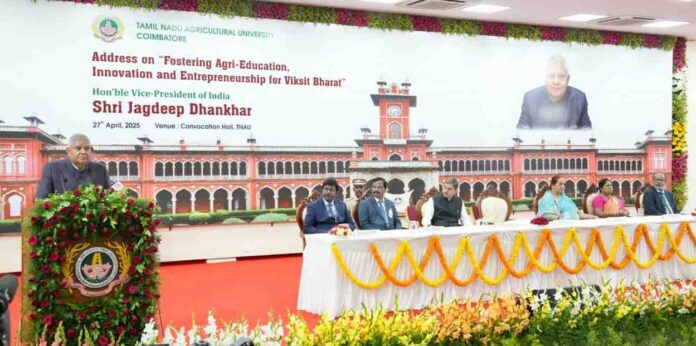APRIL 27: The Vice-President of India, Shri Jagdeep Dhankhar said,“Bharat is the world’s oldest civilisation, a peace-loving nation where inclusivity and freedom of expression and thought are our legacy.”Addressing the gathering at Tamil Nadu Agricultural University, Coimbatore, Tamil Nadu on the theme “Fostering Agri-Education, Innovation and Entrepreneurship for Viksit Bharat”, the Vice-Presidentobserved that if one traverses history for thousands of years, one would find that in our civilisation, inclusivity and freedom of expression thrived, blossomed, and were respected. In present times, he said, the quotient and gradient of expression and inclusivity are comparably the highest in the world, “Look around, there is no other country like Bharat which can demonstrate inclusivity and freedom of expression,” he said, adding that as citizens of this great nation—the largest democracy, the oldest democracy, the most vibrant democracy—we need to be extremely watchful, mindful and cognisant that freedom of expression and inclusivity must turn out to be our national assets.
Turning to the agriculture sector, the Vice-President underscored that “we must move from food security to farmer prosperity.” The farmer, he said, has to be prosperous, and this evolution must originate from institutions like Tamil Nadu Agricultural University.
He further elaborated that farmers must step out of the farmland and involve themselves in marketing their produce. “Farmers should not just be a producer and forget about it. That would mean they will painstakingly, tirelessly raise a produce and will sell it at a time when it is right for the market, without holding it. It doesn’t give much financially,” he noted. He called for empowering the farmers by generating awareness and by informing them that the government cooperative system is very robust.
“For the first time, we have the Cooperation Minister. Cooperatives find place in our Constitution. Therefore, what we need is farmer traders. We need farmer entrepreneurs. Change that mindset, so that a farmer transforms himself from producer to a value adder, starting some industry which is based on least produce,” he said.
The Vice-President also emphasized that the farm produce market is gigantic, and when value is added to the farm produce, industry will thrive.
Shri Dhankhar underlined that it is the duty of every citizen to bear this in mind, particularly at a time when the nation is witnessing unstoppable exponential economic rise, extraordinary growth in infrastructure, technological penetration reaching to the last mile, and the international repute of the nation and its leader, the Prime Minister, is at the highest ever, “We as citizens, therefore, have a great role to contribute to sustain this rise of the nation,” he asserted.
Emphasizing citizen participation, the Vice-President said that this is the right time for every citizen to fully become aware and also take advantage of the ecosystem of hope and possibility. He urged everyone to take a firm resolve that nation first will be our motto, our unflinching commitment to nation and ever guiding star. “No interest can be higher than that of the Nation,” he stressed.
Highlighting the role of research and technology in agriculture, he stressed that the gap between lab and land must not merely be bridged—it must be a seamless connect. “Lab and land must be together and for this, over 730 Krishi Vigyan Kendras must be vibrant centres of interaction with farmers, to educate the farmers,” he said. He also called for connecting Krishi Vigyan Kendras and the Indian Council of Agricultural Research, which in itself has over 150 institutions focusing on every aspect of Agronomy.
He recalled, “India has traversed from food scarcity to food being in plenty, and Tamil Nadu Agricultural University has effected agrarian development and served the broader cause of rural transformation.”
Paying rich tributes, the Vice-President noted, “one of the towering giants of the agro-sector, one of the proudest sons of Bharat, Dr. M.S. Swaminathan, was an alumnus of Tamil Nadu Agricultural University”. He pointed out that Dr. Swaminathan had the rare distinction of being the recipient of all four civilian awards, including the highest one—the Bharat Ratna.
Calling for impact-oriented innovation and research, he said that innovation and research initiatives must be evaluated as to what impact they have on the farmer. “Are they having ground impact? Therefore, research has to be applied. Research must be based on need. Research must serve a cause which you identify,” he advised. He added that research must be supported not only by government at the Centre and the State but also by industry, trade, business, and commerce.
In his concluding remarks, the Vice-President observed that India—our Bharat—has always been a land of agriculture. Its heart pulsates in villages. It is the lifeline of employment and economy, and the spinal strength of the nation in every sense of the term.
Recalling the ancient wisdom of the Tamil land, he remembered that in this sacred land, the role of the farmer was taken to a high level by the great poet-saint Thiruvalluvar. Citing him, the Vice-President said, “Farmers are the cornerstone of humanity and agriculture as the foremost craft.”He lauded Thiruvalluvar’s wisdom, calling it timeless, and remarked that “the farmer is the provider of our food. The farmer is the architect of our destiny.”
Shri R.N. Ravi, Governor of Tamil Nadu, Smt. N. Kayalvizhi Selvaraj, Minister for Human Resources Management, Govt. of Tamil Nadu, Shri V. Dakshinamoorthy, Agricultural Production Commissioner and Secretary to Government, Dr. M. Raveendran, Director of Research, Tamil Nadu Agricultural University, Dr. R. Thamizh Vendan, Registrar and Acting Vice Chancellor Tamil Nadu Agricultural University and other dignitaries were also present on the occasion.






